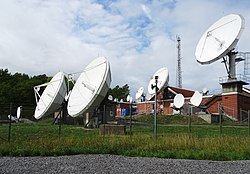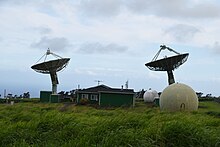Swedish Space Corporation
 | |
 The antenna facility in Ågesta, Sweden | |
| Company type | Government-owned |
|---|---|
| Industry | Space |
| Founded | 1972 in Solna, Sweden |
| Headquarters | Solna , Sweden |
Key people | |
Number of employees | 630 (2022) |
| Website | www |

The Swedish Space Corporation, SSC, also registered as Svenska rymdaktiebolaget,[1] is a Swedish space services company. SSC operations consist of launches of sounding rockets and stratospheric balloons, tests of future generation rocket engines and new rocket fuels, operation and maintenance of space and aviation systems, as well as satellite communications through the use of SSC ground stations deployed around the world. SSC is also working on developing its Space Surveillance Tracking (SST)[2] and Space Traffic Management (STM) programs with the aim to identify, assess and minimize risks of collisions and disruptions associated with space debris.[3][4]
In January 2023, Spaceport Esrange, a new establishment of Esrange Space Center was inaugurated – the first facility on EU mainland with the capability of launching satellites.[5][6] The first satellite launch is expected to take place in 2024.
SSC operations in Sweden are located in Solna, Kiruna and Ågesta. The company also has operations in Australia, Chile, the Netherlands, Thailand, Germany, the United States and the United Kingdom. SSC has roughly 630 employees and an MSEK 1,263 turnover in 2022.[7][8]
Business areas
[edit]Development of space systems
[edit]SSC has more than fifty years of experience in helping space agencies, companies, commercial actors and research institutes gain access to space. The company designs, develops and tests various types of space systems, rocket systems, subsystems and experimental equipment for research, in space or near-space environments. Common areas of application are microgravity experiments, atmospheric research and testing and validation of space-related systems.
SSC has specialist competence in satellite communications, rocket and balloon systems, launching of rockets and balloons, and provides consulting services for satellite operators.
Satellite communications
[edit]SSC has one of the world's largest and most active civilian networks of ground stations that communicate with various types of satellites. SSC's worldwide network of ground stations uses the group's own as well as contracted satellite stations around the world. SSC has its own ground stations in Sweden, US, Canada, Chile, Thailand and Australia. The company also has partnering ground stations in Germany, Italy, Spain, South Africa, Antarctica, India and Japan.
Most scientific satellites, as well as many Earth observation satellites, orbit the Earth's poles. The strategic location of Esrange Space Center, above the Arctic Circle, allows for regular contact with satellites as they pass within range several times a day. Esrange is today one of the world's most used satellite stations.
Through the company's subsidiaries LSE[9] in Germany and Aurora Technology[10] in the Netherlands, SSC offers consulting services in satellite control. A third subsidiary, GlobalTrust[11][12] in Great Britain, offers analysis of satellite data.
Esrange
[edit]Esrange Space Center, the world's most versatile space center and a hub for SSC operations, is located outside Kiruna in northern Sweden, above the Arctic Circle (68°N, 21°E). In addition to the infrastructure that forms the base site, there is also access to a large, unpopulated impact and recovery area covering an area twice the size of Luxembourg (about 5,200 km2). The facility has been in operation since 1966 and was initially part of the European Space Agency (ESA) before becoming a part of SSC as the company was founded in 1972.[13][14]
From Esrange, SSC launches sounding rockets and stratospheric balloons for research in various research disciplines. The base also houses a satellite communications station which forms the hub of SSC's global network of ground stations, with around 30 antennas on site.
The newest facility within the base, Spaceport Esrange, was inaugurated on 13 January 2023 by H.M. King Carl XVI Gustaf, Swedish Prime Minister Ulf Kristersson and European Commission President Ursula von der Leyen. Spaceport Esrange is the first facility on EU mainland with the ability to launch satellites into orbit.[15] The facility will also be used for Europe’s program for the development of reusable rockets, Themis,[16] which is run by Ariane Group on behalf of the European Space Agency (ESA). The facility will also be used for test launches of the next generation of sounding rockets.
Future European rocket technology is also tested at the base's test beds.[17] There, various space actors develop reusable, more sustainable and cost-effective rocket technology.
Space Situational Awareness
[edit]The number of satellites in near-Earth space is expected to reach nearly 10,000 within the next few years. In that same area of space, large amounts of space debris are also in orbit. It is estimated to be more than 130 million objects, some as small as a millimeter, traveling at high speed around the Earth.
The increasing number of objects in orbit around the Earth increases the risk of collisions. SSC's is therefore expanding its initiative in the area of Space Situational Awareness (SSA),[18] which aims to detect, predict and assess the risks of spacecraft launches and re-entry.
The SSC has started a program whose task is to track and catalog the objects in orbit around the Earth – so-called Space Traffic Management (STM) – a communication system to avoid potential collisions during launch and for satellites in orbit in the future.[19]
Customers
[edit]SSC's largest customers in space systems development and launch services are the Swedish National Space Agency (SNSA) and the European Space Agency (ESA). Satellite operation services and satellite consulting services are performed on behalf of satellite owners, satellite operators and space agencies worldwide. Tests of space and flight systems are conducted for both Swedish and foreign companies as well as the armed forces.
History
[edit]Rymdbolaget was established by the Swedish government in 1972 to be the executive body for the State Delegation for Space operations, now under the name of Swedish National Space Agency (SNSA). The company was formed in 1972 by Esrange Space Center and Rymdtekniska Gruppen in Solna, Stockholm. During the period 1966–1972, Esrange was an ESA owned facility but in 1972 the ownership passed into Swedish ownership in connection with the formation of Rymdbolaget. Today, SSC has no official duties, and the company is 100 percent owned by the Swedish state.
Since the turn of the millennium, the company has expanded and now has operations in Australia, Chile, the Netherlands, Thailand, Germany, the US and the UK. For instance, in 2000, SSC acquired Universal Space Network, USN, a company founded by space pioneer and astronaut Charles "Pete" Conrad, Jr. He was the third human to walk the Moon. The acquirement of USN, nowadays known as SSC Space US, marks the starting point in which SSC began establishing a global ground station network which today is one of the biggest civilian networks in the world. The acquisition is also reflected in today's growth into the lunar market.
Over the years, SSC has also designed and built satellites, developed airborne ocean surveillance systems used by coastguard organizations worldwide,[20] as well as assisted the Swedish Defence Materiel Administration, FMV,[21] with the operation, maintenance, and development of test systems at the Vidsel test site. All of these businesses have today been divested.
Scientific satellites developed
[edit]- Prisma satellites – launched 15 June 2010
- SMART-1 – launched 27 September 2003
- Odin – launched 20 February 2001
- Astrid 2 – launched 10 December 1998
- Astrid 1 – launched 24 January 1995
- Freja – launched 6 October 1992
- Viking – launched 22 February 1986
Telecom satellite project management
[edit]Rocket program at Esrange (selection)
[edit]Balloon program at Esrange (selection)
[edit]- SAMBO
- PIROG
- CHEOPS
- STRAFAM
- EASOE
- THESEO
- ARCHEOPS
- ENVISAT
- SUNRISE
- POGO
- HADT
- HEMERA
- BEXUS
- Solna (headquarters and development center)
- Esrange Space Center, Kiruna (launch and test services and satellite communications)
- Ågesta (teleport services)
- North Pole, Alaska, USA (satellite station)
- Clewiston, Florida, USA (satellite station)
- Horsham, Pennsylvania, USA (office)
- South Point, Hawaii, USA (satellite station)
- Inuvik, Canada (satellite station)
- Harwell, UK (office)
- Winchester, UK (office)
- Darmstadt, Germany (office)
- Gilching, Germany (office)
- Noordwijk, Netherlands (office)
- Santiago, Chile (satellite station)
- Punta Arenas, Chile (satellite station)
- Siracha, Thailand (satellite station)
- Western Australia Space Center, Australia (satellite station)
Wholly owned subsidiaries
[edit]- Aurora Technology, Lisse, The Netherlands (satellite operations consultants)
- LSE Space, Munich and Darmstadt, Germany (satellite operations consultants)
- GlobalTrust, Winchester, UK (satellite data analysis)
References
[edit]- ^ "Svenska rymdaktiebolaget – Bokslut & Nyckeltal". allabolag.se. Archived from the original on 28 March 2023. Retrieved 30 May 2023.
- ^ "Space Situational Awareness: Key Issues in an Evolving Landscape" (PDF). Archived (PDF) from the original on 27 September 2022. Retrieved 30 May 2023.
- ^ "SSA Programme overview". esa.int. Archived from the original on 15 April 2023. Retrieved 30 May 2023.
- ^ Ohlsson, Philip (13 December 2022). "Debris and congestion – a future challenge in Space". SSC – Swedish Space Corporation. Archived from the original on 10 June 2023. Retrieved 30 May 2023.
- ^ Sternlund, Hans (13 January 2023). "Här invigs rampen på Esrange i Kiruna: "Europa har fått fotfäste i rymden"". SVT Nyheter (in Swedish). Archived from the original on 28 March 2023. Retrieved 30 May 2023.
- ^ Forsberg, Rebecca (25 January 2023). "Spaceport Esrange – Europas svenska språngbräda till rymden". Populär Astronomi (in Swedish). Archived from the original on 9 June 2023. Retrieved 30 May 2023.
- ^ Regeringskansliet, Regeringen och (23 January 2015). "Svenska rymdaktiebolaget (SSC)". Regeringskansliet (in Swedish). Archived from the original on 28 April 2023. Retrieved 30 May 2023.
- ^ "Svenska rymdaktiebolaget – Bokslut & Nyckeltal". allabolag.se. Archived from the original on 28 March 2023. Retrieved 30 May 2023.
- ^ "LSE Space – Welcome to LSE Space". Archived from the original on 31 May 2023. Retrieved 30 May 2023.
- ^ "Aurora Technology B.V. – Space engineering and scientific support". Archived from the original on 30 May 2023. Retrieved 30 May 2023.
- ^ "GlobalTrust – Using space to empower government and companies to act ethically for a better world". GlobalTrust. Archived from the original on 5 June 2023. Retrieved 30 May 2023.
- ^ Rönnbäck/TT, Erik Paulsson (10 December 2020). "Rymdbolaget köper brittisk satellitstartup". Svenska Dagbladet (in Swedish). ISSN 1101-2412. Archived from the original on 28 March 2023. Retrieved 30 May 2023.
- ^ "Esrange and ESA". esa.int. Archived from the original on 15 January 2023. Retrieved 30 May 2023.
- ^ "Rymdbasen Esrange". Rymdstyrelsen (in Swedish). Archived from the original on 28 March 2023. Retrieved 30 May 2023.
- ^ "Sweden aims to launch Europe's space age". POLITICO. 13 January 2023. Archived from the original on 2 June 2023. Retrieved 31 May 2023.
- ^ "Themis". esa.int. Archived from the original on 8 July 2023. Retrieved 30 May 2023.
- ^ "Regeringen investerar i rymden – Esrange får testbädd". News Powered by Cision (in Swedish). 9 July 2018. Archived from the original on 28 March 2023. Retrieved 30 May 2023.
- ^ "Space Situational Awareness – SSA". esa.int. Archived from the original on 28 March 2023. Retrieved 30 May 2023.
- ^ Ohlsson, Philip (13 December 2022). "Debris and congestion – a future challenge in Space". SSC – Swedish Space Corporation. Archived from the original on 10 June 2023. Retrieved 30 May 2023.
- ^ "Havsövervakning till Sjöland & Thyselius – Förvärvar SSC:s Airborne Systems". News Powered by Cision (in Swedish). 15 May 2014. Archived from the original on 28 March 2023. Retrieved 30 May 2023.
- ^ "FMV – "Jag är jätteglad att ni valde att följa med till FMV"". 5 February 2018. Archived from the original on 5 February 2018. Retrieved 30 May 2023.
- ^ "Our stations". SSC – Swedish Space Corporation. Archived from the original on 5 August 2023. Retrieved 30 May 2023.
External links
[edit]- Swedish Space Corporation – Official website
- OHB Sweden – Official website
- SSC Ground Station Network
